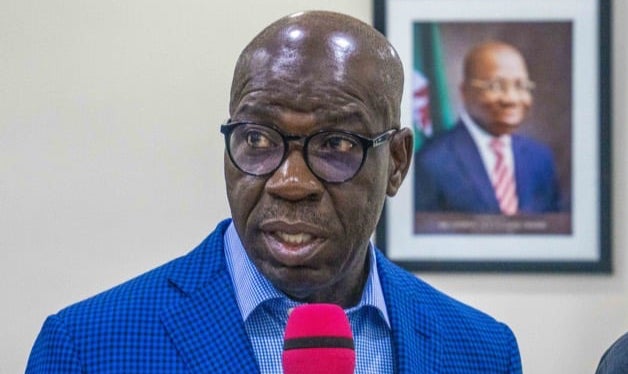As Edo State prepares for its forthcoming gubernatorial election, Governor Godwin Obaseki has issued a stern warning, describing the contest as a ‘do-or-die affair’.
The governor, a member of the People’s Democratic Party (PDP), spoke at a rally in the Ekemwan area, highlighting his administration’s achievements and cautioning the opposition against electoral malpractices.
Obaseki’s fierce rhetoric underscored the high stakes involved in the upcoming election, warning that any form of electoral misconduct, particularly from opposition parties, could lead to dire consequences.

His impassioned speech captured both his determination to safeguard what he believes to be the state’s progress under his leadership and his fear of regression should the opposition take control.
A Battle for Edo’s Future
Governor Obaseki’s tenure has been marked by substantial changes in Edo State, which he frequently highlights as evidence of his commitment to development and progress.
In his speech at the rally, Obaseki criticised his predecessor for a lack of regard for the welfare of the people, particularly women and vulnerable groups.
According to the governor, the previous administration, which he claims encouraged prostitution and human trafficking, failed to offer dignity or opportunity to women in the state.
Obaseki emphasised that, since taking office, his administration had brought about significant improvements, particularly in the welfare of pensioners.
“When I took over office, our pensioners wore black on Labour Day, but today they wear white,” he stated, pointing to improved living conditions for the elderly as one of his administration’s successes.
Further addressing the youth unemployment crisis he inherited, the governor highlighted the job creation initiatives implemented under his leadership.
He stressed that prior to his tenure, Edo’s youth were largely without employment, but under his governance, new opportunities had been created. Obaseki also claimed that the state had become safer, ranking among the most secure in Nigeria after eight years of his leadership.
Electoral Tensions and Obaseki’s Warning
However, beyond reflecting on his accomplishments, Obaseki’s rally took on a more confrontational tone as he turned his focus to the looming election. With a firm declaration, the governor stated, “This election is a do-or-die affair. If they do, we will die.”
This pointed remark was directed at his political opponents, whom he accused of plotting to undermine the election’s integrity. Obaseki’s warning of severe consequences in response to any form of electoral malpractice highlighted the tense atmosphere surrounding the upcoming vote.
The governor’s statement could be interpreted as a reflection of the broader challenges facing Nigeria’s electoral process, where accusations of vote rigging, violence, and interference are common concerns.
Obaseki’s forceful stance indicates his determination to prevent such actions in Edo State, but it also raised concerns about the potential for political violence or unrest.
The governorship election, scheduled for Saturday, September 21, promises to be a highly contested race, with three main candidates emerging as front runners.
In addition to the PDP’s Asue Ighodalo, the All Progressives Congress (APC) has put forward Monday Okpebholo, while the Labour Party (LP) is represented by Olumide Akpata.
Asue Ighodalo, a technocrat and entrepreneur, is Obaseki’s handpicked successor and the PDP’s choice for the governorship.
Ighodalo is campaigning on a platform of continuity, promising to build on Obaseki’s developmental strides and further improve the state’s infrastructure, education, and healthcare sectors.
Monday Okpebholo, the APC candidate, represents the main opposition. Okpebholo’s platform focuses on security, economic development, and reversing what he sees as the mismanagement of resources under Obaseki’s administration.
He has criticised the incumbent governor for failing to deliver on key promises and insists that Edo State needs new leadership to address lingering issues such as unemployment and inadequate public services.
Olumide Akpata of the Labour Party is also in the race, offering an alternative to the traditional two-party system.
Akpata, a lawyer and former president of the Nigerian Bar Association, has garnered a significant following, particularly among younger voters who see him as a fresh face in Edo politics. His campaign centres on transparency, youth empowerment, and social justice.
As the election draws closer, the political atmosphere in Edo State is fraught with tension.
Governor Obaseki’s warning about potential electoral malpractice has raised the stakes, with concerns growing about the possibility of violence or unrest.
The governor’s portrayal of the election as a ‘do-or-die’ affair underscores the seriousness with which he views the outcome, not only for his political legacy but for the future of Edo State.
While Obaseki’s fiery rhetoric may be seen as an effort to rally his base and dissuade opposition interference, it also highlights the fragility of Nigeria’s democratic process.
The 2023 election will be a significant test of the state’s political stability, and the outcome will have far-reaching implications for Edo’s governance.
As voters prepare to head to the polls, all eyes are on Edo State. The contest between the PDP, APC, and LP is expected to be closely watched, with the state’s future hanging in the balance.
For Governor Obaseki, the election represents not just a political battle but a fight for the preservation of his administration’s legacy.
Support InfoStride News' Credible Journalism: Only credible journalism can guarantee a fair, accountable and transparent society, including democracy and government. It involves a lot of efforts and money. We need your support. Click here to Donate
